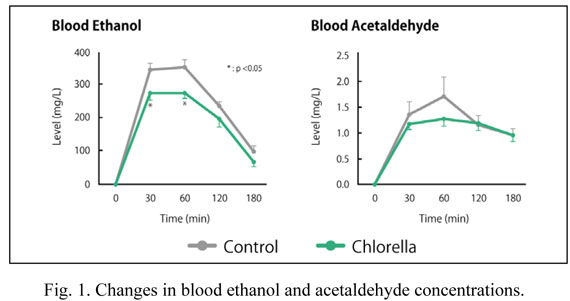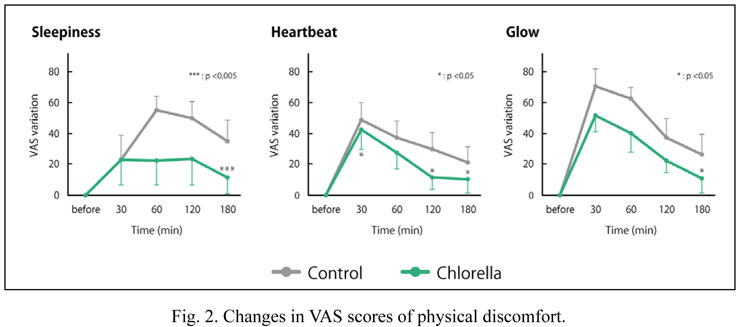- TOP
- List of reports
- The effect of Chlorella on the alcohol metabolism of healthy volunteers
The effect of Chlorella on the alcohol metabolism of healthy volunteers
【Scientific information】
Research and Development Department, Sun Chlorella Corporation
The effect of Chlorella on the alcohol metabolism of healthy volunteers
Presented at the Annual Meeting of the Japan Society for Bioscience, Biotechnology, and Agrochemistry 2011
- Study Objectives
- Alcohol consumed as alcoholic beverages is absorbed from the stomach and duodenum, and is decomposed in the liver into water and carbon dioxide as final products to be excreted out of the body. During the course of decomposition, acetaldehyde is formed, and this substance is responsible for the nauseous feeling experienced after drinking. In approximately half of the Japanese population, the ability to break down acetaldehyde is reduced, and thus alcohol-related symptoms, such as a red face, appear. Assuming that a faster metabolism of alcohol would make these peoples' life with alcohol more comfortable, we investigated the potential effects of chlorella on human alcohol metabolism and physical discomfort.
- Experimental procedures
- This study was conducted on a total of six healthy males who were informed as to the purpose of the study. Subjects were divided into two groups: the control group and the chlorella group. Subjects in the control group were orally given only water, whereas subjects in the chlorella group were orally given water and 40 tablets of chlorella. All subjects ate an identical meal and then ingested either only water or water plus chlorella tablets, and 30 minutes later consumed alcohol at 0.5 mg/kg body weight (which is equivalent to 750 mL of beer containing 4% of alcohol for a person weighing 60 kg). Subsequently, blood and expired air samples were collected over time and changes in alcohol concentrations were examined. In addition, subjective feelings of physical discomfort, such as sleepiness, rapid heartbeat, and glow, were measured using visual analog scale (VAS) testing.
- Results
- Chlorella ingestion before consuming alcohol led to significantly decreased ethanol concentrations in the blood, and a tendency of decreasing acetaldehyde concentrations in the blood and ethanol concentrations in expired air (Fig. 1). In addition, sleepiness, rapid heartbeat, and glow were significantly reduced by chlorella ingestion compared with chlorella group (Fig. 2). These findings suggest that chlorella ingestion can promote alcohol metabolism in humans.


Presentation at a scientific meeting
- Name of meeting:
- The Annual Meeting of the Japan Society for Bioscience, Biotechnology and Agrochemistry 2011
- Title:
- The effect of Chlorella on the alcohol metabolism of healthy volunteers
- Presenters:
- Masako SAITO1) , Hirofumi CHUBACHI1) , Syukuko EBIHARA2) , Katsuhisa SAKANO3) , Hideo TAKEKOSHI1)
- Affiliation:
- 1)Sun Chlorella Corporation, 2)Chiyoda Paramedical Care Clinic, 3)CPCC Company





